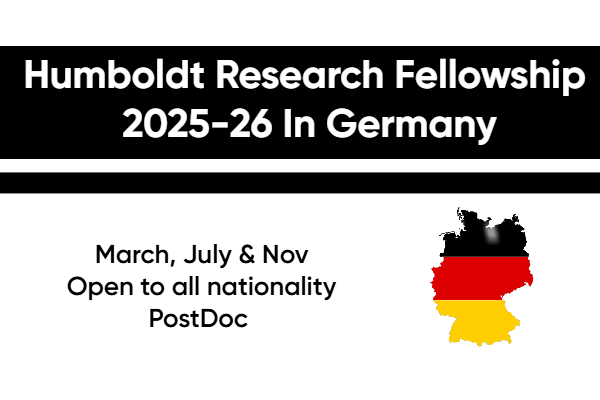Introduction of Humboldt Research Fellowship 2025-26
Germany’s reputation as a global hub for innovation and academic excellence is unmatched, making it an ideal destination for researchers seeking to expand their knowledge and expertise. The Humboldt Research Fellowship 2025-26 presents an exceptional opportunity for postdoctoral scholars from around the world to advance their careers in a dynamic and intellectually stimulating environment.
Offered by the Alexander von Humboldt Foundation, this prestigious, fully funded fellowship allows researchers to conduct groundbreaking studies in their respective fields while immersing themselves in Germany’s renowned academic and research institutions. With generous financial support, access to world-class facilities, and the chance to collaborate with leading experts, the fellowship is a stepping stone toward global recognition and career advancement.
Beyond financial aid, the Humboldt Research Fellowship fosters an inclusive and diverse research culture, connecting scholars with a vast international network of over 26,000 alumni across 140+ countries. Notably, 49 Nobel laureates have been a part of this distinguished program, reflecting its impact on scientific and academic progress.
In this comprehensive guide, we’ll explore everything you need to know about the Humboldt Research Fellowship 2025-26, including eligibility criteria, financial benefits, required documents, and expert tips for a successful application. Whether you’re an aspiring researcher looking to enhance your expertise or a seasoned academic seeking new opportunities, this fellowship could be the key to unlocking your next big breakthrough.
Must Check Other Funded Fellowships
Indo-Pacific Futures Fellowship 2025-26: A Fully Funded Leadership
World Press Institute Fellowship 2025 in the USA.
Details of Humboldt Research Fellowship:
| Host Coutry | Germany |
| Eligible Nations | Open to All |
| Fellowship Coverage | Fully Funded |
| Stipend | 2700+ Euro |
| Deadline | March, July & November |
What is the Humboldt Research Fellowship?
Fellowship Overview
The Humboldt Research Fellowship is a prestigious award designed for postdoctoral researchers and experienced academics to pursue independent, long-term research projects in Germany.
- Organizer: Alexander von Humboldt Foundation
- Duration: 6–24 months (flexible based on research needs)
- Funding: Fully funded (stipend, insurance, travel, and family support)
Named after the visionary explorer Alexander von Humboldt, this fellowship has supported over 26,000 researchers from 140+ countries since 1953, including 49 Nobel laureates.
Follow for More Latest Updates:
Why Choose the Humboldt Research Fellowship?
1. Unparalleled Financial Support
The fellowship covers all essential costs, allowing you to focus entirely on your research.
- Monthly stipend: €2,670+ (adjusted for experience)
- Health insurance: Comprehensive coverage for you and dependents.
- Travel allowance: Round-trip flights and relocation costs.
- Family benefits: €346/month for spouses and €294/month per child (for stays ≥3 months).
- Research funding: Access to grants for lab equipment, conferences, and language courses.
2. Prestige and Networking
As a Humboldt fellow, you’ll join a distinguished network of global scholars. The foundation hosts exclusive events, workshops, and networking opportunities to foster collaborations.
3. Flexibility
Choose your host institution and research timeline. Whether you’re analyzing climate change or developing AI algorithms, Germany’s world-class facilities are at your disposal.
Eligibility Criteria for the 2025-26 Fellowship
To qualify for the Alexander von Humboldt research fellowship, applicants must meet these requirements:
Academic Qualifications
- Hold a PhD, C.Sc., or equivalent degree completed within the last four years.
- Demonstrate outstanding research potential through publications, awards, or recommendations.
Language Proficiency
- English fluency is mandatory (no formal test required).
- German skills are advantageous but not compulsory.
Nationality Rules
- Open to all nationalities.
- German citizens may apply if they’ve resided/worked abroad for ≥5 years.
How to Apply: Step-by-Step Guide
Step 1: Prepare Required Documents
- CV (2 pages): Highlight academic achievements and research experience.
- Research Proposal (5 pages): Clearly outline objectives, methodology, and relevance.
- Publications List: Showcase your most impactful work.
- Doctoral Certificate: Proof of PhD completion (or confirmation if pending).
- Recommendation Letters: Two references from senior academics.
Step 2: Submit Online Application
Apply via the Alexander von Humboldt Foundation portal. Ensure all documents are uploaded before the March, July, or November 2025 deadlines.
Step 3: Await Selection Results
Applications are reviewed by independent academics. Successful candidates receive invitations within 4–7 months.
5 Tips to Strengthen Your Application
- Tailor Your Proposal: Align your project with Germany’s research priorities (e.g., sustainability, digitalization).
- Choose the Right Host: Partner with a German institution that complements your expertise.
- Highlight Impact: Emphasize how your work addresses global challenges.
- Secure Strong References: Select recommenders familiar with your research.
- Proofread Thoroughly: Avoid errors to maintain professionalism.
Must Check fully funded Scholarships
Daad Scholarships in Germany for Pakistani Students In 2025-26
How to Secure the IDEX Master Scholarship in France 2025
Conclusion: Launch Your Research Career in Germany
The Humboldt Research Fellowship 2025-26 is more than funding—it’s a career-defining opportunity to collaborate with leading minds, access state-of-the-art resources, and contribute to global knowledge. With three annual deadlines, now is the time to start crafting your application.
Q1: Can I apply without a PhD?
No. A PhD or equivalent is mandatory.
Q2: Is there an age limit?
No, but the fellowship targets early-career researchers (typically under 40).
Q3: Can I extend the fellowship?
Yes, extensions up to 24 months are possible for postdoctoral researchers.
Views: 905

